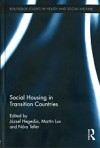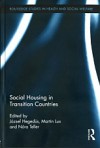Publications
Filter publications
Or use fulltext search
The chapter describes and evaluates the development of both market-based housing finance and social housing finance in post-socialist transition countries.
The chapter describes and evaluates the rent setting and rent regulation in post-socialist transition countries; and development of new demand-side subsidies.
The chapter describes and evaluates the history and recent state-of-art of social housing in the Czech Republic.
The chapter compares the different strategies in social housing in 12 post-socialist transition states, evaluates their overall efficiency and effectiveness, and list the main factors behind the success of different strategies.
The paper aims to show the most common paths to homelessness in the Czech Republic. The theoretical approach applied in this paper attempts to move beyond the structure–agency debate by focusing on the characteristics that most homeless people share on their paths to homelessness. The paper reveals that the pervasiveness of consumer credit has often been a critical juncture on the pathway to homelessness, despite the assistance available from a strong welfare state.
The aim of this article is to identify the main factors that lead to the successful reintegration of the homeless into long-term housing in the postsocialist Czech Republic, identify the barriers to successful reintegration, and, in the light of these factors and barriers, assess the effectiveness of existing and potentially new state housing policies. The authors also assess innovative changes that could be made to this assistance in the form of ‘guaranteed housing’.
This volume intends to fill the gap in the range of publications about the post-transition social housing policy developments in Central and Eastern Europe by delivering critical evaluations about the past two decades of developments in selected countries’ social housing sectors, and showing what conditions have decisively impacted these processes.
The chapter describes and evaluates the progress in social housing in post-socialist transition states, especially from the perspective of social landlords.
The chapter describes and evaluates the changes in housing tenures in post-socialist transition states – especially for rental and owner-occupied housing.
The chapter describes and evaluates the changes in housing policies in Central and Eastern European countries after 1989.
Housing conditions form an important part of social stratification in many advanced industrial economies. The objective of this article is to determine the extent to which social stratification is linked to housing inequalities in the post-socialist Czech Republic; and how this relationship has evolved during the course of the economic transformation process.
This article examines whether housing tenure and regional differences in housing affordability have an impact on labour mobility. This relationship is important for understanding the sources of structural unemployment and impediments to economic growth. Using two sample surveys from the Czech Republic, this research reveals that at the individual level housing tenure is the most powerful factor determining willingness to change residence for employment reasons.
The objective of the paper is to explain one phenomenon evident in the transformation of post-socialist states: the restitution of the housing stock. In the paper, the theory of social constructivism, including Kemeny's advanced application of this theory to the field of housing studies, is used to (a) explain the causes for a particular type of property restitution in the Czech Republic and (b) outline its consequences on the role and long-term social meaning of private rental housing.
The return of property expropriated during the communist period to previous owners or to their descendants (property restitution) led to the quick emergence of a private rental sector in many post-communist countries soon after 1990. This article compares the genesis of private rental tenure in the Czech Republic and Estonia.
Cet article se propose de décrire brievement le systeme du logement social dans l’un des pays de la transition postcommuniste, la République tcheque. Dans une premiere partie, nous replacerons les réformes du logement dans les États de la transition dans leur contexte historique plus large. Les deux parties suivantes traitent de l’institutionnalisation du logement social, notamment en République tcheque, pour le logement municipal existant et neuf.
The goal of this paper is to outline the main factors influencing the diverse consequences of the global economic crisis on housing and mortgage markets in two post-socialist economies—the Czech Republic and Hungary. In the former there was a mild decline of markets while in the latter there has been a depression of markets. The paper also contributes to the convergence and divergence debate on housing policies in Europe.
The paper focuses on homelessness in the Czech Republic. The aim of the paper is to describe the causes of housing exclusion as well as the factors of successful social reintegration and re-housing.
The policy paper contains the proposal for structural changes of several housing policy measures in the Czech Republic. The goal of the reform is to increase policy effectiveness, efficiency, tenure neutrality and anticyclicity. The second section of paper describes the results of large-scale simulations of the reform and its impact on public expenditures and income distribution.
Chapter focuses on three research questions: (1) How strong is the relationship between the key aspect of social stratification – socio-economic status of the household head – and housing inequalities in the Czech Republic? (2) If such relationship exists, how it has been evolving during past two decades? (3) What dimension(s) of housing inequalities, if such exists, is most significantly linked to social stratification?












Facebook
Twitter